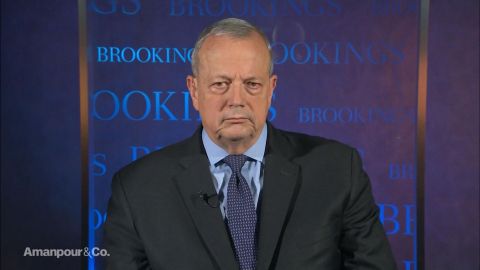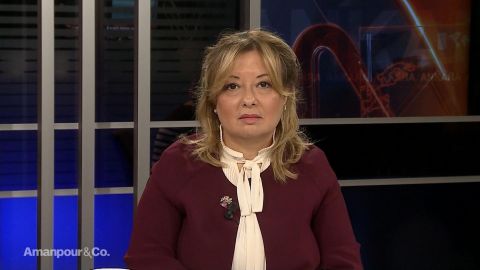Read Transcript EXPAND
CHRISTIANE AMANPOUR: From your perspective, as a commander, and if you were sitting in Ankara, and you saw all these conflicting tweets and you know about the conversation between the two presidents on Sunday night, are they correct to be confused about what the United States thinks? Or do you believe that the U.S. made it very clear from the beginning that this should not happen?
RET. GEN. JOHN ALLEN, FORMER ENVOY TO THE GLOBAL COALITION TO DEFEAT ISIS: This is just chaos, Christiane. We don’t do strategy and we shouldn’t be doing foreign policy by tweet. And this is what you get when you have single phone calls between world leaders occurring and no — when they put the phone down, no further coordination within the U.S. Government. Our national security mechanism in this country was largely surprised by that phone call and surprised by the tweet that called for the withdrawal of American forces, and surprised by the president’s threats against Turkey to destroy its economy. And, of course, the Turks were, I think, similarly surprised by the president’s reaction and now, of course, we have this White House statement which, I think, throws more confusion into the situation.
AMANPOUR: And the only people who are actually not confused in their intent are the Turks and they have — as she, Ms. Aybet told me, for several years intended to clear this area, as you just said, to create a safe haven to put back some of the Turkish — sorry, Syrian refugees who’ve come into Turkey. But just one other thing, you heard Ms. Aybet say that they are using the air space with impunity right now. Yesterday, we were told by the U.S. administration that they were warning the Turks that they would close the air space to their aircraft as a way to warn them against, you know, excessive force. It’s clearly not happening or the threat didn’t amount to much.
ALLEN: Well, again, when you — when we say we’ve closed the air space, clearly the first next thing we have to be prepared to say is how we will enforce the closure of the air space. Whether it’s a formal closure or whether it’s an agreement. We have to be very clear in what will happen if Turkey violates that air space. And if dealing with the Turkish aircraft as they’re attacking conceivably, truly, our allies on the ground, the PYD, if the Turks inter that air space and attack those allies, we should be very clear about what we’re going to do in the protection of our allies. Not necessarily retaliation against the Turks but how we’re going to protect our allies. And, of course, that clarity was not announced and so absent that, the Turks are, my guess is you’re telling me some of the things that I’m learning right on the spot. My guess is they’re using the air space as necessary to support the prosecution of this operation.
About This Episode EXPAND
Gülnur Aybet discusses the situation between Turkey and the Syrian Kurds with Christiane Amanpour, then John Allen gives his perspective on the subject. Writer and director Chris Morris joins the program to discuss the new film “The Day Shall Come.” Mark Cuban sits down with Walter Isaacson and reflects on his career as an entrepreneur.
LEARN MORE



